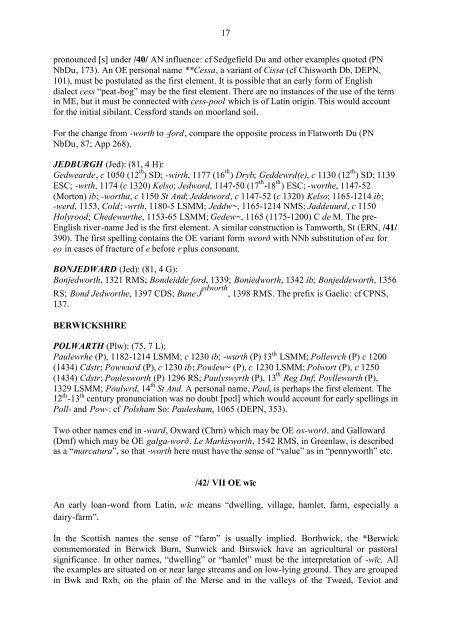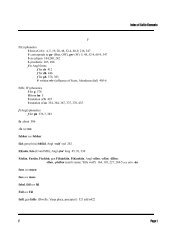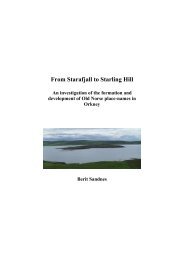May Williamson: The Non-Celtic Place-Names of the Scottish Border ...
May Williamson: The Non-Celtic Place-Names of the Scottish Border ...
May Williamson: The Non-Celtic Place-Names of the Scottish Border ...
Create successful ePaper yourself
Turn your PDF publications into a flip-book with our unique Google optimized e-Paper software.
17<br />
pronounced [s] under /40/ AN influence: cf Sedgefield Du and o<strong>the</strong>r examples quoted (PN<br />
NbDu, 173). An OE personal name **Cessa, a variant <strong>of</strong> Cissa (cf Chisworth Db, DEPN,<br />
101), must be postulated as <strong>the</strong> first element. It is possible that an early form <strong>of</strong> English<br />
dialect cess “peat-bog” may be <strong>the</strong> first element. <strong>The</strong>re are no instances <strong>of</strong> <strong>the</strong> use <strong>of</strong> <strong>the</strong> term<br />
in ME, but it must be connected with cess-pool which is <strong>of</strong> Latin origin. This would account<br />
for <strong>the</strong> initial sibilant. Cessford stands on moorland soil.<br />
For <strong>the</strong> change from -worth to -ford, compare <strong>the</strong> opposite process in Flatworth Du (PN<br />
NbDu, 87; App 268).<br />
JEDBURGH (Jed): (81, 4 H):<br />
Gedwearde, c 1050 (12 th ) SD; -wirth, 1177 (16 th ) Dryb; Geddewrd(e), c 1130 (12 th ) SD; 1139<br />
ESC; -wrth, 1174 (c 1320) Kelso; Jedword, 1147-50 (17 th -18 th ) ESC; -wor<strong>the</strong>, 1147-52<br />
(Morton) ib; -wortha, c 1150 St And; Jeddeword, c 1147-52 (c 1320) Kelso; 1165-1214 ib;<br />
-werd, 1153, Cold; -wrth, 1180-5 LSMM; Jeddw~, 1165-1214 NMS; Jaddeuurd, c 1150<br />
Holyrood; Chedewur<strong>the</strong>, 1153-65 LSMM; Gedew~, 1165 (1175-1200) C de M. <strong>The</strong> pre-<br />
English river-name Jed is <strong>the</strong> first element. A similar construction is Tamworth, St (ERN, /41/<br />
390). <strong>The</strong> first spelling contains <strong>the</strong> OE variant form weorð with NNb substitution <strong>of</strong> ea for<br />
eo in cases <strong>of</strong> fracture <strong>of</strong> e before r plus consonant.<br />
BONJEDWARD (Jed): (81, 4 G):<br />
Bonjedworth, 1321 RMS; Bondeidde ford, 1339; Boniedworth, 1342 ib; Bonjeddeworth, 1356<br />
RS; Bond Jedwor<strong>the</strong>, 1397 CDS; Bune J edworth , 1398 RMS. <strong>The</strong> prefix is Gaelic: cf CPNS,<br />
137.<br />
BERWICKSHIRE<br />
POLWARTH (Plw): (75, 7 L):<br />
Paulewrhe (P), 1182-1214 LSMM; c 1230 ib; -wurth (P) 13 th LSMM; Pollevrch (P) c 1200<br />
(1434) Cdstr; Powwurd (P), c 1230 ib; Powlew~ (P), c 1230 LSMM; Polwort (P), c 1250<br />
(1434) Cdstr; Poulesworth (P) 1296 RS; Paulyswyrth (P), 13 th Reg Dnf; Poylleworth (P),<br />
1329 LSMM; Poulwrd, 14 th St And. A personal name, Paul, is perhaps <strong>the</strong> first element. <strong>The</strong><br />
12 th -13 th century pronunciation was no doubt [po;l] which would account for early spellings in<br />
Poll- and Pow-: cf Polsham So: Paulesham, 1065 (DEPN, 353).<br />
Two o<strong>the</strong>r names end in -ward, Oxward (Chrn) which may be OE ox-worð, and Galloward<br />
(Dmf) which may be OE galga-worð. Le Markisworth, 1542 RMS, in Greenlaw, is described<br />
as a “marcatura”, so that -worth here must have <strong>the</strong> sense <strong>of</strong> “value” as in “pennyworth” etc.<br />
/42/ VII OE wīc<br />
An early loan-word from Latin, wc means “dwelling, village, hamlet, farm, especially a<br />
dairy-farm”.<br />
In <strong>the</strong> <strong>Scottish</strong> names <strong>the</strong> sense <strong>of</strong> “farm” is usually implied. Borthwick, <strong>the</strong> *Berwick<br />
commemorated in Berwick Burn, Sunwick and Birswick have an agricultural or pastoral<br />
significance. In o<strong>the</strong>r names, “dwelling” or “hamlet” must be <strong>the</strong> interpretation <strong>of</strong> -wīc. All<br />
<strong>the</strong> examples are situated on or near large streams and on low-lying ground. <strong>The</strong>y are grouped<br />
in Bwk and Rxb, on <strong>the</strong> plain <strong>of</strong> <strong>the</strong> Merse and in <strong>the</strong> valleys <strong>of</strong> <strong>the</strong> Tweed, Teviot and




